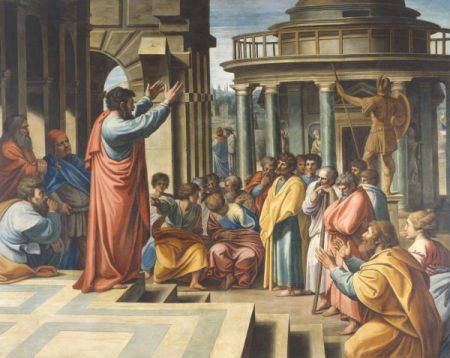Following is a guest post from Dan Lindberg.
Just as Jesus stepped out of a tomb into a whole new world, I’d like to use this post to invite you into a new world, a new world of thinking. Join me as we journey back in time.
You’ve probably heard of the “sacred-secular” divide; but no such divide existed before late into the Enlightenment. So while it is so taken for granted today, it’s only been around for a fraction of the world’s recorded history. “Well,” you say, “what on earth do you mean?” Here are a couple of examples from history. The Roman emperor Domitian brought the descendants of Jesus’s half siblings to trial for being part of a “royal bloodline.” “Dan! This is thousands of years ago! What about today?” Look no further than our own backyard. KeHe Distributors, LLC, a food distribution company, has as its founding value: “We thank and honor God in all we do.” So politics and business are not something that is separate from “religion,” whatever we mean by that word (ever stopped to think about it?).
Humans cannot be separated from their spirituality. A haunting consequence of this fact is that we cannot not worship. The double negative is intended. Which means we are not a secular society in the West, we are one which is pagan, and increasingly overtly so. As Bob Dylan once wrote, “you’ve gotta serve somebody.”
So which gods are rearing their heads once more? While they are as myriad as in ancient Rome, let me suggest three: Mars, Aphrodite, and Mammon.
Mars. Mars was the god of war and violence in ancient Rome (Greek: Ares). It is not difficult to see his worshippers in Eastern Europe or the Middle East, where tanks fill streets and assault rifles are on the shoulder. Easy to his dark power in the Brussels bombing or the Charleston shooting. But his work can be very subtle. As sociologist James Davison Hunter revealed in his timely book, To Change the World, politics in America has been increasingly motivated by a sense of “re-sentiment,” which leads to the will to dominate your opponent politically, and Christians have been caught up in it. Does Tyler Wigg-Stevenson’s analysis apply to you?
Side taking is a very human thing to do. It allows us to pretend that the problem is the other and to avoid facing the truth dwelling somewhere near the heart of every conflict: that under every balance of injustice, humanity itself is the problem. And this is the reason that so few of us . . . actually want to save the world. We usually just want our side, whatever it may be, to win.
Aphrodite. Aphrodite was the god of love, beauty, and sexuality in ancient Greece (Roman: Venus). As a church that loves the written word, we are familiar enough with Romans 1 and its careful inclusion of all “dishonorable passions” that those who long for intimacy outside the life-giving ways of our loving Father. We’re also (sadly) familiar with the epidemic of pornography and how it provides oxygen for the sex-trafficking flame. However, she too can be shrewd. Read the words of New Covenant’s previous Lead Pastor, Doug O’Donnell, as he shows that even the married relationship can be manipulated by Aphrodite:
Unmet expectations (in marriage) are our unexpected undoing. I thought he’d be this; I thought she’d be that. I thought we’d live ‘happily and effortlessly ever after.’ The idol of a perfect marriage is as dangerous as the idol of eros. Love and marriage make wonderful bedfellows, but terrible gods.”
Mammon. Finally Mammon, who is not a god of Rome or Greece, but is mentioned by Jesus in Matthew 6:24 (translated as “money” in the ESV). Again, the overt examples of Mammon’s faithful are not difficult to find as any quick glance at the Forbes’ 400 list will reveal. Capitalism has been called a most powerful institution in the modern era, a diagnosis nearly impossible to refute. The industry in which I serve, the Financial Services industry, is exercising enormous blind faith in those who run the Central Banks of the world, such as the Federal Reserve Bank. As you may have guessed, though, Mammon has more secret ways of sneaking into our lives. How about these words from Herman Daly & John Cobb: “Shopping has become the great national pastime. The one place one can be most assured of a welcome is in a store. Status attaches to finding usual goods and prices.” Did you celebrate the last “great deal” that you found? Was it such “good news” that you had to tell someone about it?
These gods in our day work the same way that they did thousands of years ago. They emphasize one good thing about the creation (power, beauty, resources), and then elevate that to the supreme status upon which all else must submit. And in the end, they ask for all of us and leave us empty.
Our calling is to remove the masks of these idolatrous “deities” who cannot speak, love, or give life. This is Jesus’ agenda in the Sermon on the Mount, an activity that we will analyze more carefully in next week’s post.
Dan Lindberg has been a member of New Covenant Church since 2014 and lives close to the Church with his wife Katie and daughter Anna.





